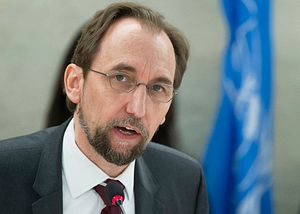In early February, the United Nations High Commissioner for Human Rights, Zeid Ra’ad Al Hussein, conducted his first official mission to Indonesia since taking office in 2014. During the three day visit, February 5-7, Al Hussein met with President Joko Widodo, high level government representatives including the minister of foreign affairs and the minister of religion, civil society organizations, religious leaders, and the three Indonesian national human rights institutions. It was the first mission by the UN’s top human rights official to Indonesia since the previous high commissioner, Navi Pillay, in 2012. Whilst some breakthroughs have been made regarding the advancement of human rights across the archipelago, a number of issues raised as concerns by the former high commissioner remain unresolved.
In Indonesia, people of diverse sexual orientations and gender identities have not been provided with the protection urged by Navi Pillay during her 2012 visit, and are now facing unprecedented criminalization under the new formulation of the Draft Revised Penal Code that outlaws homosexual relations. The 1965 Blasphemy Law that Navi Pillay recommended be repealed remains a source of human rights violations and discrimination against religious minorities. The law is currently, for the third time, having its constitutionality tested by a judicial review in the Constitutional Court. The discriminatory enforcement of Sharia in Aceh that the former high commissioner called out also continues to create an environment of intimidation and fear in the autonomous region.
On the other hand, Indonesia has continued to engage with and largely fulfill its commitments to the international human rights treaty and charter-based bodies it is a party to. The state’s impressive tradition of ratifying human rights conventions has continued with its ratification of the International Convention on the Protection of the Rights of All Migrant Workers and Members of their Families and the ASEAN Convention Against Trafficking in Persons, Especially Women and Children.
While human rights are generally experiencing a decline across the region, Indonesia has demonstrated its commitment to human rights through facilitating the visits of a number of special procedures including the special rapporteur on health and adequate housing. Indonesia’s active participation in the Human Rights Council’s Universal Periodic Review in Geneva last year and its adoption of the majority of recommendations put forth by countries reviewing its human rights performance further demonstrated its openness in engaging with the international community to advance human rights.
During the mission, the National Commission on Violence Against Women (Komnas Perempuan), in performing one of its roles as a bridge between civil society and the international human rights mechanisms of the United Nations, facilitated a meeting between civil society organizations, victims groups, and the delegation of the high commissioner. An open forum was created in which survivors of past human rights abuses, women human rights defenders, victims of various forms of gender-based violence, and academics, had the opportunity to deliver oral statements to the high commissioner. Al Hussein expressed his admiration and appreciation for the bravery and strength of the civil society movement.
Komnas Perempuan, in an additional closed meeting with the high commissioner, voiced its appreciation for the official mission and delivered updates about a number of issues pertaining to violence against women and the situation of women’s human rights in Indonesia. Child marriage, polygamy, virginity testing in the military, the criminalization of abortions, cyber violence against women, gender based violence in contexts of natural resources conflicts, past human rights violations, violence and discrimination against religious minorities, and the implementation of the Qanun Jinayat — or the Sharia-based Islamic Criminal Code — in Aceh were among the issues that Komnas Perempuan highlighted during the visit.
The Draft Revised Penal Code and the Elimination of Sexual Violence Bill, two pieces of legislation currently being debated in Indonesia’s People’s Representative Council (DPR), were also on the agenda during the visit. The Elimination of Sexual Violence Bill as it was originally formulated is a piece of draft legislation that provides for comprehensive protection and rehabilitation measures for victims of sexual violence, focuses on preventing the occurrence of violence, and outlines new sentencing options for perpetrators Speaking in a press conference, Al Hussein urged the country’s legislature to pass the important piece of draft legislation that provides “essential protection for victims of sexual and gender based violence.”
The other piece of draft legislation that became a focus for the top human rights official was the Draft Revised Penal Code that is set to be passed into law on February 14. Alarmingly, Article 484 Paragraph 1(E) of the code currently makes extramarital sex a criminal offence able to be punished by up to five years in jail. This is a provision that human rights activists are afraid will result in the criminalization of rape victims, an increase in child marriage and a rise in vigilante mob actions. The high commissioner also voiced his concern about the Draft Penal Code explaining “Moreover, should the penal code be revised with some of the more discriminatory provisions, it will seriously impede the Government’s efforts to achieve the Sustainable Development Goals, and would run counter to its international human rights obligations.”
In general, Indonesia’s openness and transparency in receiving the mission must be applauded, as should the state’s offer to facilitate a mission of the Office of the United Nations High Commissioner for Human Rights to Papua that materialized during the visit.
As Indonesia enters a year that is to be defined by political power struggles with simultaneous election of regional heads looming in 2018 and the presidential election in 2019, Al Hussein’s visit will hopefully act as a reminder for Indonesia to hold on to its tradition of tolerance and to strive for the advancement of human rights in a region were human rights are generally experiencing regression.
Jack Britton is a translator, researcher and freelance writer currently embedded with the Indonesian National Commission on Violence Against Women (Komnas Perempuan) in Jakarta, Indonesia.
































